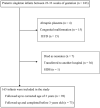Pre-eclampsia Complicated With Maternal Renal Dysfunction Is Associated With Poor Neurological Development at 3 Years Old in Children Born Before 34 Weeks of Gestation
- PMID: 33996679
- PMCID: PMC8116540
- DOI: 10.3389/fped.2021.624323
Pre-eclampsia Complicated With Maternal Renal Dysfunction Is Associated With Poor Neurological Development at 3 Years Old in Children Born Before 34 Weeks of Gestation
Abstract
Objective: The purpose of this study was to investigate perinatal factors associated with a poor neurodevelopmental outcome in preterm infants. Methods: A retrospective study was conducted by searching our clinical database between January 2006 and December 2016. A total of 165 singleton children who were born between 23 and 33 weeks of gestation were included. We defined poor neurological development outcomes as follows: cerebral palsy; intellectual disability; developmental disorder including autism and attention-deficit/hyperactivity disorder; low score (<85 points) on Bayley Scales of Infant and Toddler Development, Third Edition (Bayley-III); or low score of Kyoto Scale of Psychological Development corrected at 3 years old. We diagnosed maternal renal dysfunction according to the Clinical Practice Guideline for chronic kidney disease 2018 and the Best Practice Guide 2015 for Care and Treatment of Hypertension in Pregnancy. Results: The rate of poor neurological development was 25/165 (15.2%): cerebral palsy (n = 1), intellectual disability (n = 1), developmental disorder (n = 2), low score of Bayley-III (n = 20), and low score of Kyoto Scale of Psychological Development (n = 1). Preeclampsia complicated with maternal renal dysfunction (P = 0.045) and delivery at <30 weeks of gestation (P = 0.007) were independent risk factors for poor neurological development. Conclusions: In addition to previous risk factors such as delivery at <30 weeks of gestation, preeclampsia complicated with renal dysfunction was also associated with poor neurodevelopmental outcomes corrected at 3 years old.
Keywords: maternal renal dysfunction; neurological development; pre-eclampsia; preterm delivery; small for gestational age.
Copyright © 2021 Yoneda, Yoneda, Tsuda, Ito, Shiozaki, Niimi, Yoshida, Nakashima and Saito.
Conflict of interest statement
The authors declare that the research was conducted in the absence of any commercial or financial relationships that could be construed as a potential conflict of interest.
Figures
Similar articles
-
Neurodevelopmental outcome in extremely preterm infants at 2.5 years after active perinatal care in Sweden.JAMA. 2013 May 1;309(17):1810-20. doi: 10.1001/jama.2013.3786. JAMA. 2013. PMID: 23632725
-
Delivery before 32 weeks of gestation for maternal pre-eclampsia: neonatal outcome and 2-year developmental outcome.Early Hum Dev. 2004 Jan;76(1):39-46. doi: 10.1016/j.earlhumdev.2003.10.004. Early Hum Dev. 2004. PMID: 14729161
-
Neurodevelopmental disabilities and special care of 5-year-old children born before 33 weeks of gestation (the EPIPAGE study): a longitudinal cohort study.Lancet. 2008 Mar 8;371(9615):813-20. doi: 10.1016/S0140-6736(08)60380-3. Lancet. 2008. PMID: 18328928
-
Association of Histologic Chorioamnionitis With Perinatal Brain Injury and Early Childhood Neurodevelopmental Outcomes Among Preterm Neonates.JAMA Pediatr. 2018 Jun 1;172(6):534-541. doi: 10.1001/jamapediatrics.2018.0102. JAMA Pediatr. 2018. PMID: 29610829 Free PMC article.
-
Does low-dose aspirin initiated before 11 weeks' gestation reduce the rate of preeclampsia?Am J Obstet Gynecol. 2020 May;222(5):437-450. doi: 10.1016/j.ajog.2019.08.047. Epub 2019 Sep 5. Am J Obstet Gynecol. 2020. PMID: 31494125
Cited by
-
[Outcome of neonates born to mothers with chronic kidney disease].Zhongguo Dang Dai Er Ke Za Zhi. 2023 Jan 15;25(1):104-108. doi: 10.7499/j.issn.1008-8830.2207017. Zhongguo Dang Dai Er Ke Za Zhi. 2023. PMID: 36655672 Free PMC article. Review. Chinese.
-
Early-onset preeclampsia/gestational hypertension may be associated with a low incidence of cerebral palsy at 3 years old in singleton very low-birth-weight infants born at 28-31 weeks of gestation (EOPE-DQ study): a multi-center retrospective cohort study in 2013-2016.Hypertens Res. 2025 Jan;48(1):88-101. doi: 10.1038/s41440-024-01929-8. Epub 2024 Oct 8. Hypertens Res. 2025. PMID: 39379466
References
LinkOut - more resources
Full Text Sources
Other Literature Sources



